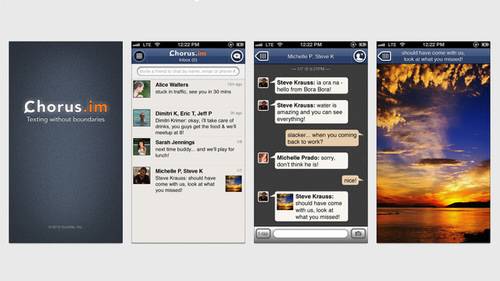
Does the world need another messaging service? The team behind Chorus.im thinks so, and they’re banking on the browser as the future of anywhere, anytime costless communication. Chorus, an HTML5-based chat service that launches today, works on any device with a browser, and claims to let you reach anyone you could call or email, whether or not they’ve ever even heard of Chorus.
Why HTML5? “If all of us are trying to overthrow SMS, it should use the network that’s the most ubiquitous,” says Steve Tran, the company’s founder and CEO. An HTML5 framework lets the app work in any browser, mobile or otherwise. “We think messaging is likely to be a core application in the HTML5 frontier,” he adds, noting that it offered the least restrictions.
Founded roughly nine months ago and based in Mountain View, Calif., Chorus is basically a team of four, three of whom previously worked together on a voice application platform called BeVocal acquired by Nuance Communications back in 2007. The team has received angel funding, but runs as a self-described lean operation with no immediate plan for venture capital investment.
Biting The Dead Hand Of Carrier SMS
Chorus claims its app is the only HTML5, browser-centric messenger out there. But it will have to demonstrate some immediate advantages, because it’s joining an all-out firefight in the instant-messaging market.
A growing crowd of services — such as, for instance, WhatsApp and WeChat — aim to kill off carrier-bound SMS and its unreasonably high fees and lack of social media integration. Built-in smartphone features such as Apple’s iMessage have also been chipping away at the carriers’ grip on text communication.
And it’s not just in the U.S. Just last week, The Wall Street Journal reported on the rise of Line, a messaging service popular in Japan that has joined the anti-SMS ranks, and also pointed out that “the rise of texting apps has taken away $23 billion in revenue from carriers as of the end of 2012….” Beyond Line, Samsung has ChatOn, Deutsche Telekom invested in Pinger, and Yahoo Japan purchased a 50% stake in the Japanese subsidiary of South Korea’s KakaoTalk.
The point is that the war is raging, and to catch on and stand out in the field of messaging services is becoming almost as hard establishing a new social network.
Almost Frictionless
Chorus calls itself “frictionless” because users can jump in and out of conversations while moving, say, from a laptop to a phone to a tablet — and with no registration required. Though a profile goes a long way toward making things easier. With Chorus, it’s required if you want to initiate conversations.
In other words, if somebody invites you to chat, you can accept and communicate, but you can’t start conversations yourself unless you register with a username, email and password. (Alternatively, you can sync an account from Google+ or Facebook.) The service has also launched iOS and Android apps for the sole purpose of enabling mobile push notifications, something smartphone browsers don’t allow at the moment.
But random signups aren’t how the Chorus team expects users to dive in. If you know someone’s email address or phone number, you can pull them directly into a chat — again, no registration required on their part. And from there the new user can decide whether registering seems worth the trouble.
Which means that Chorus effectively makes no distinction between its registered users and everyone else when it comes to chatting in the moment, a feature its team thinks will be key to its success.
“A lot of the over-the-top messaging apps, they’re effectively all walled gardens. They’re creating their own network,” Tran says. With Chorus, there’s no wall, and the garden is more like an open field. But naturally, that has its pros and cons.
Scaling The Walled Gardens
Services like Facebook Messenger or the popular mobile app WhatsApp are indeed walled gardens to varying degrees. But as Tran suggests, a service like Chorus will inevitably face the problem of pulling users away from ecosystems and buddy lists they’re familiar with. At the end of the day, messaging comes down to ease, and if there’s anything heavy mobile users are invested in, it’s in the tool they use to text.
Through straightforward integration, Chorus also lets you bring in contacts from your phone, Facebook and Google all into one address book. That’s not new to the world of messaging services, though Chorus claims it lets you do so easily and in a way that saves you the hassle of building up yet another useless profile and trying to organize a contact list.
“In our worldview, users already have a friends list — it’s called their address book. They shouldn’t have to create a new one and should have the flexibility to immediately send messages to whomever they want,” the company states in its official press release.
Which is, effectively, the main draw of Chorus: its ability to let you reach anyone without having to worry about whether they’re on a phone or a laptop, or iMessage or Google Talk or Facebook. In a space where there’s so many different ways to communicate that it makes your head spin, to have a stripped down service that does what you want it to do is an ideal solution. If it catches on.

















